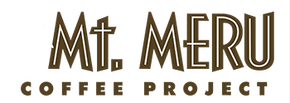ABOUT THE COFFEE
- What kind of coffee is MMCP buying?
-
This is the highest quality premium Arabica coffee grown by the small scale farmers. It is shade grown at altitudes above 2,500 ft. in the rich volcanic soils on the slopes of Mt. Meru in Tanzania. All the coffees imported by the Mt Meru Coffee Project are inspected, sampled, and approved prior to being processed. Maintaining high quality requirements is essential to the sustainability of both the farmers income and the consumers support of the Project.
- From whom is the coffee being purchased?
-
The Project buys the highest quality premium coffee from small family farmers belonging to co-ops or organized grower groups living in the Meru region. Very few of the farmers have more than 3 acres of land. In 2001 200 farmers participated in the project. Today approximately 2000 farmers are participating.
- How much is MMCP paying for coffee?
-
Pricing policies are set by the project but are now reviewed regularly and established by the elected farmer representatives of the Mt. Meru Specialty Coffee Growers Association which was established. The association takes into consideration annually the farmer’s production cost, crop sustainability, inflationary forces, and the needs for a family supporting, living income as well as the prevailing local and world market prices.
- How much coffee is being imported?
-
An average of 8 to 12 tons of Mt. Meru Select Tanzanian Coffee are imported, roasted, packaged and sold annually. Since the Project began importing coffee, approximately 200 tons of coffee has been purchased from the farmers. The standard of living in the Meru region has been improved.
- What kinds of coffee are available?
-
Both Regular and Decaf coffee are available in Drip Grind, Perk Grind, Whole Bean, and Green (Unroasted) form. Flavored coffees are alsoavailable as is peaberry coffee. The coffee is roasted to a medium dark roast, which our experienced roaster has determined to be best suited for this high quality 100% Arabica coffee. The farmers produce and provide a rich flavorful cup of coffee.
ABOUT THE PROJECT
- What is the Mt. Meru Coffee Project?
-
In 1996 the Diocese of Meru, ELCT, (Evangelical Lutheran Church in Tanzania) and the Greater Milwaukee Synod, ELCA, (Evangelical Lutheran Church in America) were joined in a global, faith-based partnership. In 1999, a coffee farmer in the Mt. Meru region asked a visiting Milwaukee pastor the simple question; “We grow coffee; you drink coffee; would you buy your coffee from us?” With an answer of “Yes”, the Mt. Meru Coffee Project was born. The Project was organized to create a justice based relationship between coffee farmers in Tanzania and coffee consumers. It brings together a fair price for the farmers and a quality coffee for consumers.
The Mt. Meru Coffee Project, Inc. is incorporated as an independent not-for-profit business entity and is a part of and supported by the Greater Milwaukee Synod. The Project is managed by an all-volunteer board of directors. The day-to-day operations in the US are managed by a Project Coordinator.
The Mt. Meru Coffee Project is a registered 501(c)3 organization and is grateful for any donations in support of its mission.
- What is the mission/objective of the MMCP?
-
The Mt. Meru Coffee Project’s MISSION is to develop and grow justice based relationships, building on fair trade practices between the Meru coffee growers and US coffee consumers.
The Mt. Meru Coffee Project’s OBJECTIVES are to do Economic and Social Justice – empowering the small coffee farmers and the people of the Meru region with the ability to improve their standard of living and escape the long standing cycle of poverty.
Economic Justice is achieved when the Project, provides producing farmers with a fair price for their quality coffee. A fair price provides an increase in farm income, allowing the farmers to support their families with dignity.
 Social Justice is achieved when Project generated funds are used to upgrade coffee growing practices, improve processing facilities and equipment, and provide short term micro loan services for the small coffee farmers. Social justice is also achieved as farm families have the funds available to send children to school, access and pay for health care, and have the funds needed to support local farm village markets and merchants.
Social Justice is achieved when Project generated funds are used to upgrade coffee growing practices, improve processing facilities and equipment, and provide short term micro loan services for the small coffee farmers. Social justice is also achieved as farm families have the funds available to send children to school, access and pay for health care, and have the funds needed to support local farm village markets and merchants. - What can I do to support the MMCP?
-
Your purchase and consumption of Mt. Meru Select Tanzanian Coffee is the single most important way in which individuals, businesses, and congregations can support and become a part of the relationships in this Project, supporting thousands of small family farmers in Tanzania.
Become an “Ambassador” either as an individual or a congregation and support this justice base initiative. Order your coffee on a regular basis via e-mail, fax or mail and have it delivered freshly roasted to your door. The order, purchase and distribution process is easy to accomplish. You are provided with all the needed forms, brochures and information, including periodic updates and news articles.
HOW THE PROJECT HELPS THE FARMER?
- What portion of the retail price does the farmer receive?
-
Breaking down the cost factors for one pound of coffee in 2012 to percentages, the farmer receives 20% of the income in the retail price per pound, or $2.20. Then you might ask; what does the farmer actually take home? Out of this $2.20 amount the farmer pays for the initial processing expenses required to convert the coffee from freshly picked fruit to export bagged and ready to roast coffee, this amounts to an average of 60 cents per pound. Thus the farmers take home an amount is $1.60 per pound. This on average is yearly 25% and 50% more than what the same farmer would have received had they sold their coffee to many of the other buyers at the time.
The project does of course make a small profit which averages less than 10%. This profit is utilized to maintain and improve the sustainability of the project and also to improve local coffee operations in Meru. Over the past several years the project has utilized over $50,000 to improve processing equipment, develop loans funds, and provide for the initial expenses in developing the Mt. Meru Specialty Growers Association.
- What is the role of the Meru Diocese?
-
The Diocese of Meru, the Coffee Project Committee of the Diocese, and the stability of the church in Tanzania have provided a vital partnership link between the Project and the farmers to assure them that the Project is genuine. To do this, the Project has provided financial assistance for the employment of a full time Project Coordinator who is responsible for day to day operations in Tanzania, which involves communicating with and encouraging the farmers and co-ops to manage, harvest, and process their coffee crops with an emphasis on maintaining and improving quality.
- What effect has the project had on the small farmers?
-
In the late 1990’s, the coffee farmers had all but given up on growing coffee as a cash crop, the business of coffee and fair pricing was very unsettled. Small farmers were often the victims of unscrupulous coffee buyers and many suffered large financial losses making them quite wary. The Project, being supported through the church, was accepted as being trustworthy. This is demonstrated in the Project’s growth from 200 to over 2,000 participating farmers. Coffee is once again being seen as a good way to provide for the needs of the farm family. The justice-based pricing provides the farmers with the ability to:
- support their families
- send their children to school
- access health care
- sustain and improve their farms
- support their local cooperatives, villages and churches
ABOUT FAIR TRADE
- Is Mt. Meru Coffee “Fair Trade Coffee”?
-
Is the coffee “Fairly Traded” – Yes! ---- Is it third party “Fair Trade Certified” - No!
There are a number of organizations that provide fair trade certification. All of them have certain requirements that must be met to receive this certification. Many of these requirements are not sensitive to the local regional economies, inflexible and frankly quite costly. The Mt. Meru Coffee Project and the farmers feels that the project already meets and exceeds many of the various certification requirements and as such have jointly decided not to pursue the costly certification process at this time, allowing more of our efforts and funds to help the producing farmers.
- How does the MMCP compare to other fairly traded marketing programs?
-
Although the Mt. Meru Coffee Project and other fairly traded marketing programs seek to provide economic justice to small coffee growers by paying a fair price for their coffee, they are different in a number of ways:
The Mt. Meru Coffee Project differs from other fair trade programs by operating in a partnering relationship, paying the farmers a minimum value based on production cost, crop sustainability, inflationary issues, and the farmer’s needs for a family supporting income. Pricing policies are not set by the project. They are determined in partnership with the elected farmer representatives of the Mt. Meru Specialty Coffee Growers Association which was established in 2005.
Participating farmers presently (2012) receive $2.20 per pound for their high quality, Select Tanzanian Coffee. In 2011 prices on the Tanzanian and world markets were exceeding $2.50 per pound. The project maintained a premium pricing policy and the participating farmers received an amount of $2.80 per pound. In the 2012 market, prices fell drastically to average around $1.50 per pound. This price drop was due in part to a large increase in worldwide coffee production and in part to a reduction in demand. The cost of production, sustainability, and supporting a family however has not gone down. The project continues working cooperatively with the Association, to provide a minimum $2.20 per pound in justice based pricing.
The MMCP differs from many other fair trade programs as it provides a direct connection between small coffee farmers and coffee consumers through its ministry partnership. Other fair trade programs use a more traditional buyer, exporter, wholesaler, retailer process.
Although the MMCP does not directly fund Meru-Milwaukee Partnership activities, it does play a significant role in these activities through its “Ambassador” or in the church sales representatives that seek membership support for;
- a local hospital and clinics
- schools and scholarship programs
- hunger relief and water supply programs
- via parish to parish partnering, and numerous other long and short term projects.




 Social Justice is achieved when Project generated funds are used to upgrade coffee growing practices, improve processing facilities and equipment, and provide short term micro loan services for the small coffee farmers. Social justice is also achieved as farm families have the funds available to send children to school, access and pay for health care, and have the funds needed to support local farm village markets and merchants.
Social Justice is achieved when Project generated funds are used to upgrade coffee growing practices, improve processing facilities and equipment, and provide short term micro loan services for the small coffee farmers. Social justice is also achieved as farm families have the funds available to send children to school, access and pay for health care, and have the funds needed to support local farm village markets and merchants.